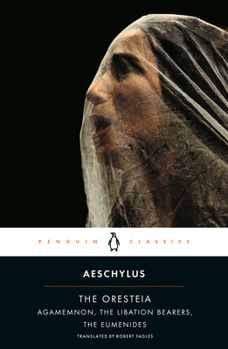Book Overview
In the Oresteia Aeschylus addressed the bloody chain of murder and revenge within the royal family of Argos. As they move from darkness to light, from rage to self-governance, from primitive ritual to civilized institution, their spirit of struggle and regeneration becomes an everlasting song of celebration. In Agamemnon, a king's decision to sacrifice his daughter and turn the tide of war inflicts lasting damage on his family, culminating...
Format:Paperback
Language:English
ISBN:0140443339
ISBN13:9780140443332
Release Date:February 1984
Publisher:Penguin Group
Length:335 Pages
Weight:0.44 lbs.
Dimensions:0.7" x 6.5" x 8.0"
Customer Reviews
4 ratings
I love this Orestia!
Published by Thriftbooks.com User , 15 years ago
Again, I compared many different Orestia's and fell in love with this one on Hackett by Meineick. It reads beautifully and easily and the drama and intensity is unmatched. You also get a believable sense of the characters, and the setting in this one. It is in my opinion the best modern version that can be most easily performable with no archai-sisms in the language. I always go with Hackett now that I've found some really excellent translations! Highly recommended.
An Interpretation, Not a Translation
Published by Thriftbooks.com User , 20 years ago
No, the translation is not literal. If you want a literal translation, buy something written by a professor of Greek. Hughes has a different goal. He¡¦s a poet who wants to interpret this ancient literature into an idiom that modern audiences can understand and appreciate. I wouldn¡¦t even call this a translation. Let¡¦s call it an interpretation and skip over the problem of accuracy. That being said, his interpretation is extremely good. The free verse is both powerful and extremely readable. By putting these stories into a more familiar medium, Hughes recaptures the horror of these plays. By modern standards, the latter plays (Choephori and Eumenides) aren¡¦t very dramatic. The main point is to watch the cycle of revenge play out to a conclusion. But the first play in the trilogy (Agamemnon) is close enough to modern taste to have a huge impact. I was very moved.
The Same Then and Now
Published by Thriftbooks.com User , 20 years ago
The Oresteia Trilogy by Aeschylus is a detailed portrayal of a family's curse and the effect it takes on them. Aeschylus wrote this trilogy between 500 B.C and 456 B.C. when the great Greek plays were being written and performed by all Athenians. Aeschylus wrote many trilogies, winning approximately thirteen first place prizes at the festivals in March. He led a life of adventure participating in several wars, the most famous being the war at Marathon. Even though Aeschylus wrote this trilogy hundreds of years ago, it can still be related to life today in the 21st Century. As one reads the plays one can envision their own town or life in his work. For this reason it is regarded as a "Great Greek Tragedy" and no one here seems to be arguing. As The Oresteia Trilogy begins to unravel the reader begins to experience the lives and times of the characters. They are given an exclusive view into the minds and souls of each character as they contemplate each decision. Clytemnestra and the characters surrounding her were experiencing many of the trials and life situations citizens experience today. As the Trojan War raged on in the trilogy and the citizens dealt with the absence of husbands and fathers, our country also deals with the same situation and Iraq. Wives were constantly facing the thought of their husbands' deaths or infidelity. Even though Clytemnestra had different reactions to these than most women, she still felt and experienced them. Cyltemnestra's feelings weren't unjust; her instincts of Agamemnon's infidelity were truthful. As Agamemnon was unfaithful to his wife Clytemnestra, our culture also deals with many couples that cannot seem to be pleased with just one mate. When many of these affairs are revealed violence can erupt. Violence is also a major issue in this trilogy as it is in society now. The citizens of Mycenae dealt with murders, matricides, attacks, wars and many other violent behaviors. Citizens today cannot deny the existence of too much violence in the world. We are constantly reminded, by the media, of similar murders of family members, like those in the trilogy. The reader is also constantly reminded of the violence by the never-ending curse in the story. With violence comes death, and with death comes mourning. As Electra and her brother Orestes bring Libations to their father's grave, families around the world also bring flowers and offerings to their own loved one's graves in hope to let the spirits rest. But with murder and crime justice will soon follow. No reader can deny the vast similarities between our current judicial system and the system of ancient Rome. The similarities begin with a jury, plaintiff, defense, and a judge, and the list continues. The furies also represent things in modern times. As they were tyrants and inescapable reminders, they are like guilty consciences and constant reminders that follow criminals and victims today.
Orestes for the modern world
Published by Thriftbooks.com User , 24 years ago
As a professor teaching classics in Regents College Master of Liberal Studies Program, I am always looking for translations that will entrance my students and give them that sensation of the marvelous that many of them can find only in videos and MTV. Hughes' translation of "The Oresteia" is a perfect choice. Sure, there may be in some passages a lot more of Hughes than of Aeschylus, but if that's what it takes to reincarnate those ancient and bloody tragic figures, it's a price well worth paying. After reading this book, I think my students will see "The Sopranos" as just another soap opera.





